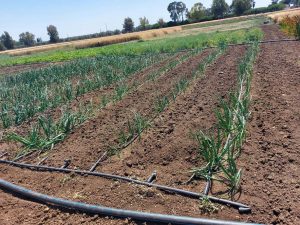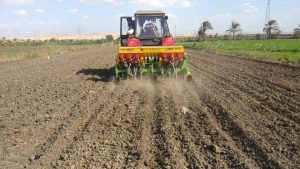SUSTAINABLE LAND, SOILS, AND WATER
2020 HIGHLIGHTS
The agricultural future of global dry areas is at grave risk from intensifying climate change, land degradation, and diminishing resources, especially water. To build livelihoods resilience and diversify cereal-based irrigated, rain-fed, and conservation agriculture food systems, ICARDA carries out sustainable land, soil, and water management research-for-development on diversified and sustainable practices for family and large-scale farming. We also develop sustainable desert agriculture and promote the safe use of treated wastewater to produce feed, forage, and trees.
In 2020, ICARDA’s Soil, Water, and Agronomy Team collaborated with other CGIAR Centers on the new frameworks that will define CGIAR’s future water management and soil health approaches across the globe under the One CGIAR reformulation.
Other 2020 highlights include:

ICARDA’s Dr. Vinay Nangia completed successful Ultra-Low-Energy (ULE) Drip Irrigation trials on olive and citrus trees and fruits and vegetables. ICARDA conducted trials in collaboration with the Massachusetts Institute of Technology (MIT), the United States Agency for International Development (USAID), and the National Institute of Agricultural Research Morocco (INRAM). In six Gulf Cooperation Council (GCC) countries, a public-private research partnership with Jain Irrigation Systems Limited (JISL) successfully tested ULE drippers for irrigating date palm plantations in six Gulf Cooperation Council (GCC) countries.
The ReWater MENA project, led by Bezaiet Dessalegn, established a new site near the Serapeum Wastewater Treatment plant in Egypt, with Swedish International Development Cooperation Agency (SIDA) funds, under the management of the International Water Management Institute (IWMI) and in collaboration with the University of Florence (UniFi). ICARDA is assessing potential water reuse options, successfully testing the production of wheat and barley crops using treated wastewater that complies with the Egypt National Reuse Code.
The iNASHR project is funded by The Deutsche Gesellschaft für Internationale Zusammenarbeit GmbH (GIZ) and developed alongside Egypt’s Agricultural Research Center (ARC) and Ministry of Agriculture and led by ICARDA’s Bezaiet Dessalegn. The project addresses Egypt’s water scarcity and soil quality while improving food security for smallholder family farmers.

In 2020 ICARDA established 420 demonstration sites, 16 percent of them women-owned. Planted with improved wheat and faba bean varieties, the demonstration sites benefit 400 individuals directly from capacity-building efforts, of which 21% are women. ICARDA also scaled up its raised bed (RB) wheat planting technology in Egypt. Results obtained in farmers’ fields during 2020 showed a clear advantage of the RB technology with a 31% saving in irrigation water, 32% increase in wheat grain yield, and 98% increase in water use efficiency.
Also, in 2020, ICARDA, in collaboration with the United States Department of Agriculture (USDA) and various federal and provincial institutes, developed a model to transfer land and water management technologies to small farmers in Pakistan. The project trained agriculture service providers (ASPs) on technologies and business, disseminating 11 technologies to 1,266 farmers over an area of 12,474 acres (5,050 ha) generating income of up to 300,000 rupees (US $3900) per season for trained ASPs. Some of the services introduced to the ASPs are installation and repairing drip systems, planting of crops on ridges and beds, and laser land leveling.
At the end of 2020, we launched a new GIZ-funded project led by Dr. Aymen Frija to develop soil and water conservation technologies tailored to specific and highly variable social and ecological contexts in Tunisia and upscale these across the relevant regions.
ICARDA also signed an agreement with the African Plant Nutrition Institute (APNI) to further research in nutrient management. The partnership has already led to joint research proposals to external donors, and APNI and ICARDA will collaborate under the One CGIAR initiatives targeting Africa. Finally, we were thrilled when Dr. Vinay Nangia joined the Advisory Board of the Global Institute for Water, Environment and Health (a Geneva-based water think tank).
